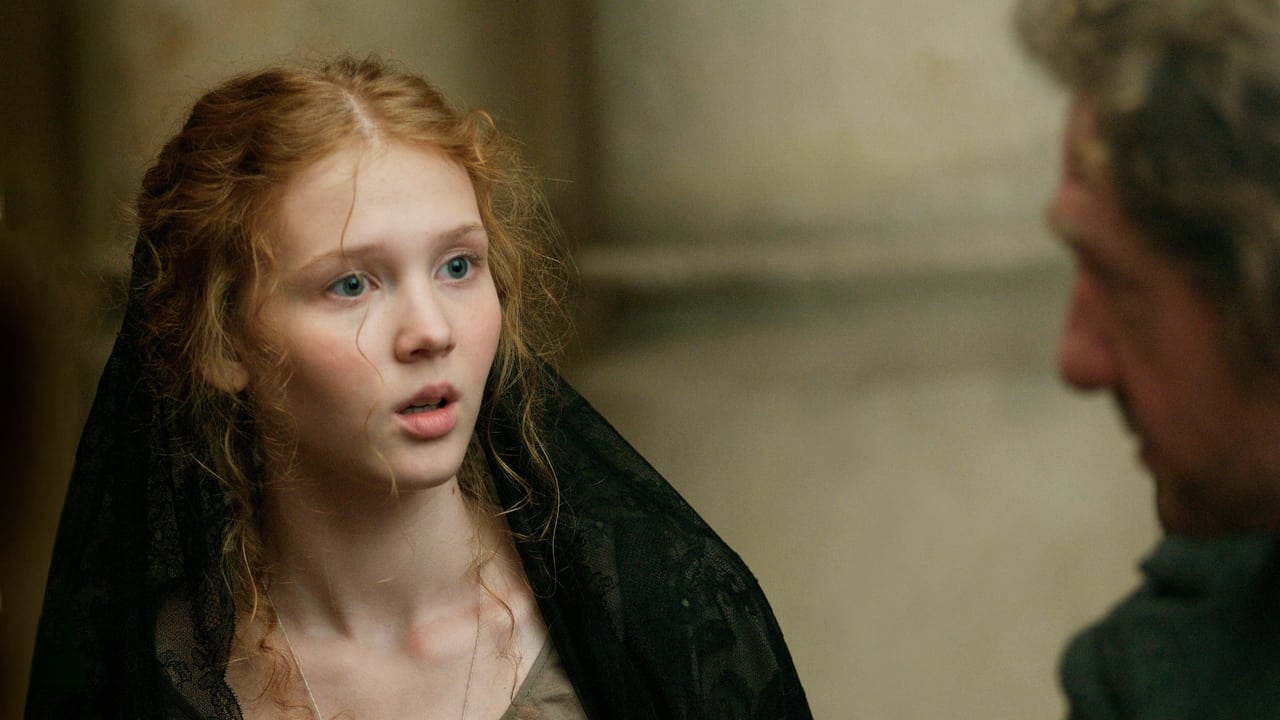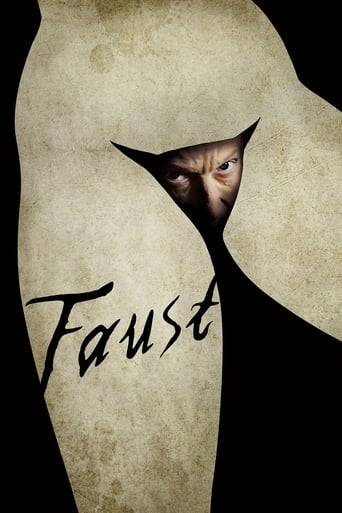

Don't listen to the Hype. It's awful
... View MoreFun premise, good actors, bad writing. This film seemed to have potential at the beginning but it quickly devolves into a trite action film. Ultimately it's very boring.
... View MoreThere is just so much movie here. For some it may be too much. But in the same secretly sarcastic way most telemarketers say the phrase, the title of this one is particularly apt.
... View MoreWhile it doesn't offer any answers, it both thrills and makes you think.
... View More"Faust" is a film loosely based on the classic novel of Johann Wolfgang von Goethe. In it, a scholar, desperately looking to find a meaning in life, meets the devil and agrees on an unholy pact that will bring him the love of a beautiful young lady in exchange for his soul.As mentioned above, this is by no means identical to the text it is based upon. Surely you could criticize this, but in my opinion it is of no harm for the movie, rather it adds some uniqueness. The general mood is very dark and sinister, with quite a few ugly scenes, which helps to draw the audience into the environment of the play and shows the desperation and the consequences of the pact in heavy pictures. I like how the filmmakers played with some of the well-known sentences from the text, even though I found it a bit confusing to quote Luther in this context. At times the camera lengthens the frame a bit, which is not my cup of tea but I guess there are people who will like it.All in all this is a very well adaption, especially because it is brave enough to be sinister and add own thoughts. This way, the film is not just one in a million of Faust-based plays but it stands out and works for itself.
... View MoreIt begins with the evisceration of a corpse, and that could be a metaphor for the way this alleged adaptation proceeds - except that Goethe's "Faust" is not dead, only given the dead-letter treatment here. The film's emphasis is on gross, clumsy physicality: you never saw so many actors stumble as they walk, bumping into things and one another; too artless and unfunny for slapstick, the universal jostling is prevented from being laughable by funereal pacing and the array of hangdog faces. Since the Faust figure (Johannes Zeiler) conveys very little in the way of intellect, all that elevates him is that most of the other characters have been made open-mouthed gapers, presumable halfwits. Wit is barred out anyway by the color-palette, all various hues of mud - the surest sign of high-serious intentions in movies nowadays. In exterior shots the sky is overexposed so it shows as a gleamless white blur; the earth is dun-colored, greens are gray-tinged, and reds are virtually absent, on their rare appearance tending to brown, like bloodstained linens oxidizing. The cut of the men's clothing updates the story to several decades after Goethe's time: trousers are worn, rather than breeches and hose. The fabrics are thick, heavy, coarse, and of course dark-dyed and fraying badly. No one could think of playing the dandy here. Strangely, there seems to be no Republic of Letters either. The few characters with intellectual interests neither write nor receive letters; they're isolated from enlightenment and worldly affairs: no one awaits the postman; no one looks at a journal of science or politics or the arts - this is a stupefying omission, as false to the historical period as it would be to Goethe's own. Sokurov's flight from historical particulars strands his Faust: the fable and the character become "timeless" in all the wrong ways. Faust doesn't represent his age's high hopes, or its seeds of self-destruction; but then he doesn't represent our age either. Sealed off in its remoteness, Sokurov's "Faust" is just another - all-too-familiar - sulking, glooming art-house reverie.
... View MoreWhere to begin with a review of Aleksandr Sokurov's Faust? Loosely based on Johann Wolfgang von Goethe's 19th century play, this Russian film resolutely defies description on normal terms. Sokurov adorns his film with sumptuous visuals throughout but adopts a very idiosyncratic storytelling technique which will prove baffling for most viewers. This is not a film to be watched lightly – you will need to be wearing your "intellectual hat" if you're to make it through two and a half hours of Sokurov's exceptionally erudite movie-making style.In the 19th century Heinrich Faust (Johannes Zeiler), a tormented scientist, desperately seeks answers to questions that hang tantalisingly beyond his grasp. Often he hires local grave robbers to dig up corpses so that he can dissect them, exploring the inside of the human body to satisfy his gruesome curiosity. What are the various organs for? What makes the body work? Is there such a thing as a soul and where is it to be found? Hopelessly disillusioned by his father's fake cure business, which mostly causes the death of patients rather than their recovery, Faust decides that he has had enough of spending his life chasing enlightenment. He is about to commit suicide when he is interrupted by the arrival of devilish deformed racketeer Mauricius (Anton Adasinsky). Mauricius leads Faust on a grotesque tour of the town, taking him into the underbelly of the community and tempting him with various sinful pleasures. He manipulates Faust at every opportunity, involving him in indulgence, lust and murder. Soon Faust finds himself infatuated with young washer-woman Margarete (Isolda Dychauk), and Mauricius eventually reveals that Faust can have her if he agrees to sign away his soul.The film is remarkable to look at, with an array of amazing sets and locations beautifully captured by cinematographer Bruno Delbonnel. The characters consist of a gallery of peasants, rogues and freaks, all performed evocatively enough by the actors but too obscurely written for the audience to truly identify with them. Indeed, therein lies the main fault with Faust it's not just the characters but the story itself that is too obscurely drawn for the film's own good. Faust won considerable admiration on the international circuit, crowning its achievements by becoming the recipient of the prestigious Golden Lion at the Venice Film Festival. It certainly has its strengths, such as the splendidly creepy performance of Adasinsky as the story's Mephistopheles figure, and the wonderfully evocative photography. However, one would have to question whether the film deserves to have been showered with the accolades that it has received. Things like confusing subtitling, perplexing dialogue and unclear story development drag it down somewhat and make one wonder quite why it has earned such towering praise. Having said that, Faust is worth a look, especially if you are interested in Faustian literature (e.g. Goethe's play, Thomas Mann's novel, or even the original Elizabethan play Doctor Faustus by Christopher Marlowe). Just be sure to prepare yourself in advance for a very heavy-going experience and don't allow yourself to anticipate some sort of extraordinary experience as promised by the glowing reviews. A life-changing, mind-blowing masterpiece, no. A flawed but interesting Gothic melodrama, yes.
... View MoreThis adaption orients itself on the original and legendary character of Dr. Faustus, but not in the Goethe version. As Dr. Faust is not an invention of Goethe, but actually a 15th century German legendary character, Sokurov portrays here the original story at its source. Faust is not driven by the wish to gain esoteric knowledge, but knowledge of how to seduce Margarethe as quickly as possible. Here lies the core: ANY character, even the ones that are not relevant to the story at all, is portrayed suffering from heavy psychological disorders. You name it, you find it: phobias, generalized anxiety disorder, social anxiety disorder, panic disorder, agoraphobia, obsessive-compulsive disorder, post-traumatic stress disorder, schizophrenia, delusional disorder, schizoaffective disorder, antisocial personality, borderline personality, histrionic and narcissistic personality disorders, even paraphilia (sexual arousal to objects, situations, or individuals that are considered abnormal or harmful to the person or others) is displayed by Mephisto, who is shown in this adaption as Moneylender. Wagner, who is Faust's student is shown suffering from classic ego-dystonic sexual orientation. This is actually what the whole adaption seems to be about: showing various characters with heavy psychological disorders who are fitted together in the story-line of the legendary character Dr. Faustus. The idea that Sokorov seems to have intended to portray is that the sexual force is the actual driving force of not only Dr. Faustus, but of most people in the sense of a primal force. My personal feeling is that the portrayal of psychological disorders is not helping to give the story-line of the legendary Dr. Faustus more appeal, but is as depiction of the human soul as dark cabinet unique as such and Faustian in itself as adaption. If you enjoy viewing a world of heavily disturbed personalities that are credibly acted out, this is your movie. If you want to see a movie that saves you reading Goethe's Faust, go find another movie. My vote: 6.5 of 10.
... View More